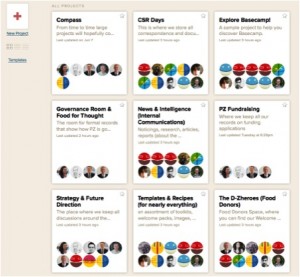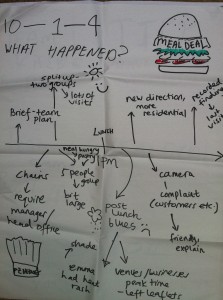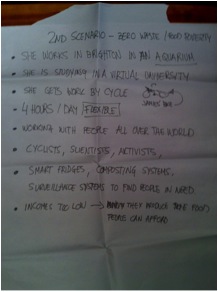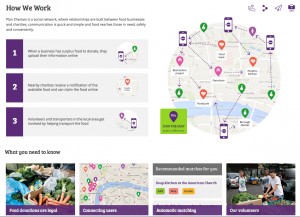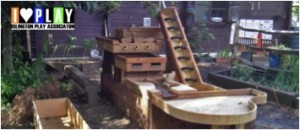In the UK, 13 million people are living in poverty, while 650,000 tonnes of perfectly good food is thrown away by food businesses. This is our call to action.
We are surplus food brokers, if you like, ‘the Uber of surplus food’. We Inspire and help connect businesses with charities to give surplus food to people who need it.
As a social network Knowledge is at the heart of everything we do: we need to know who has surplus food and when; who needs it and when; who can help transport it and when and finally; what impact has it made to those who’ve used the surplus food?
Possessing Knowledge is not enough; facilitation and community engagement are the skills that can transform that Knowledge into action, which is where the need for resources arises.
This is a truncated version of Plan Zheroes ‘Knowledge’ history.
Knowledge Management meets Plan Zheroes”: transforming activism into knowledge brokerage
Though the founders (London based) had created collateral, a food map and a brand presence (including awards from the Mayors office) scalability and transferability were a challenge.
So in autumn 2012 (after input from David Gurteen on the best format to use for an initial collaborative discussion) the first Making Use of Surplus Food Knowledge Café was held in Lewes to assess the transferability of the PZ model and whether there was a demand for surplus food; the supply is never in doubt as surplus food is always produced as a by product of our food supply chain. The two dozen attendees included the prospective Mayor, Heads of Surgery, Headmasters, Housing Associations, Restaurateurs, Publicans, Councillors and Volunteer Groups all of whom had been brought together through extensive use of social media to communicate and collaborate. Great community engagement!
Having established a positive response the PZ team set about establishing some test supply chains with councils, cafes, transport groups and embryonic food banks. It proved both scalability and transferability and drawing on that Knowledge we were able to begin to think about how we might transition from being a citizens movement to being a formally recognised Charity with Trustees, a necessary step to necessary steps for growth, accountability and a sustainable future
From a citizens movement to a CIO (and the governance structures needed for compliance)
In autumn 2013 Plan Zheroes was granted formal charitable status and a board of trustees sworn in. Without a physical home it was essential to create a virtual office, as a technological backbone that allowed us to share what we knew while providing a repository/document of record for the essential tools of governance and good management.
The (small) Trustee Board recognised the need to send a clear signal from the top on the importance of managing our Knowledge so one of the three Trustees was given the title Knowledge Trustee. After a review (led by the new Knowledge Trustee) we selected Basecamp as our document management, project management tool and collaborative backbone and a team met to determine a structure that reflected the slightly offbeat image of the new charity yet provided good search and retrieval.
Meetings were formally recorded and housed for everyone to see; all volunteers were able to identify what was happening and where to go to find the ‘stuff’ they needed.
All materials related to projects were housed in specially created ‘folders’ and a Governance folder became the central repository for compliance.
Learning from others and ourselves and sharing
We had an online map and a set of protocols for giving and receiving surplus food that built on good practice established by Pret a Manger among others.
We needed to grow the number of charities (recipients) and food businesses (donors). One mechanism we developed was to run Corporate Social Responsibility (CSR) Volunteer Days for employees of large socially minded organisations like Accenture and Unilever.
Mirroring ‘The Apprentice’ format we split groups of 10-12 people into smaller teams and set them off to see who could find the most donors and recipients during a 5 hour window in one common area.
A key Knowledge component was the Pause & Reflect session we ran at the end of the day with all the teams during which they completed their own timelines from the moment they arrived until they completed the task and then to record high points, sticky moments and behaviours they most admired from their team members.
Most importantly the PZ team conducted its own After Action Reviews when all the team members involved plus the views of the participants were captured and recorded and the learning’s fed back into the process for the next event.
A similar exercise was undertaken with the Food Waste Collective in Brighton with whom the Plan Zheroes had collaborated since formation providing documentary and logistical support as well as access to the Plan Zheroes platform.
Creating a team and widening the reach
With initial funding secured that enabled us to retain a part time CEO and an assistant our next challenge was to think more strategically and enhance our operational processes. In December 2013 we ran a Peer Assist (at the offices of our new technology partner KeyTree) in which we invited other participants and leaders in the surplus food supply chain to help us think through our future market position.
The use of personae at all levels of the supply chain to envisage the future and create a Future Story proved valuable and we had a good view of where we should position ourselves in the market.
Assistance from Cranfield Trust in helping to structure the organisational resource was a key factor while our outreach to organisations such as Borough Market (see below) were critical components of community engagement with Basecamp provided the underpinnings.
Using Knowledge tools to become better at what we do
The overwhelming evidence at the beginning of 2014 was that while our team were performing miracles on a shoestring, personal interventions and facilitation were constraining factors in getting the widespread adoption we needed. Our existing prototype platform was three years old and our new partners KeyTree volunteered to transfer the implicit and explicit knowledge of prototyping services into building a new platform, mobile responsive. Their user research also show the need to evolve towards a social network, with the power to transform the ability of those in the supply chain to make and receive donations of surplus food, for volunteers to engage and for people and organisations to act as transporters. This feels a natural extension of our Knowledge brokering role providing the most efficient tool for national and international use.
After much testing the platform was soft launched in January 2015 and is now undergoing extensive trials here and overseas.
Ours is a business that relies extensively on volunteers and part time resource, who are transient in nature. When people leave they take not just their Knowledge (and impressions), they also take their networks (of contacts and supply chains). One of the codes of practice (driven by the Trustee Board) we are putting in place is to make sure when employees depart an effort is made to acknowledge their contribution and draw out lessons and process improvements that can be applied back into the business.
The first of these Knowledge Capture sessions is taking place on May 1st.
Growing our reach and taking the Platform overseas
We recognised though that we had to expand our reach.
In autumn 2014 we were asked to give evidence to the parliamentary select committee who are investigation food waste and subsequently met with the Feeding Britain group who will become more active post the 2015 election. All this is about Knowledge Transfer!
In 2014, The Portugal Daily had written a feature on the Knowledge Café we ran and the work we’d been doing; our CEO is Portuguese so this was a human interest story as well as one that plays to a similar agenda in Portugal where the Zero Food Waste movement (Zero Desperdicio) has made huge strides including effecting a change in the VAT law which benefits those who donate surplus food.
In addition ZD had shared their knowledge globally and their processes have become an EU standard and adopted by the FAO of the UN. We are collaborating with ZD on a pilot project with the Lisboa Municipality who are using the Platform for donors and recipients.
Adopting a competencies based assessment process for the board and the management team
We have adopted the board competencies approach promulgated by Cass Business School, which seeks to match competencies at a board level to organisational priorities. We started at the board level, sharing our results with other organisations and experts, and will soon be cascading down to our embryonic management team. The process enables us to identify gaps in Knowledge and fill them while having alternates as a contingency against sudden departures.
The Future: where data is key
The ‘green’ agenda is becoming stronger across Europe and organisations involved in the food industry are facing stricter regulations (hence costs) on the disposal of surplus food aside from the moral dimension of people in food poverty. Today for example it costs £1 to dispose of each black plastic bag from a retail outlet.
Hoteliers, restaurateurs, cafes and food retailers, need to be able to trace how surplus food is disposed of in order to meet Corporate Social Responsibility and Environmental targets and improve processes.
As adoption of the Platform grows so the volume of data increases. With integral reporting functions the Plan Zheroes Platform is well placed to provide that ensuring that Big Data and Knowledge become wisdom.
And finally: Community Engagement – Borough Market & Beyond
One of the highlights of the last 18 months has been to cooperation with the many groups who now rely on the provision of surplus food from one of London’s oldest markets, Borough Market. The story is covered in our latest newsletter.
Here’s a snapshot of the impact Plan Zheroes can make:

